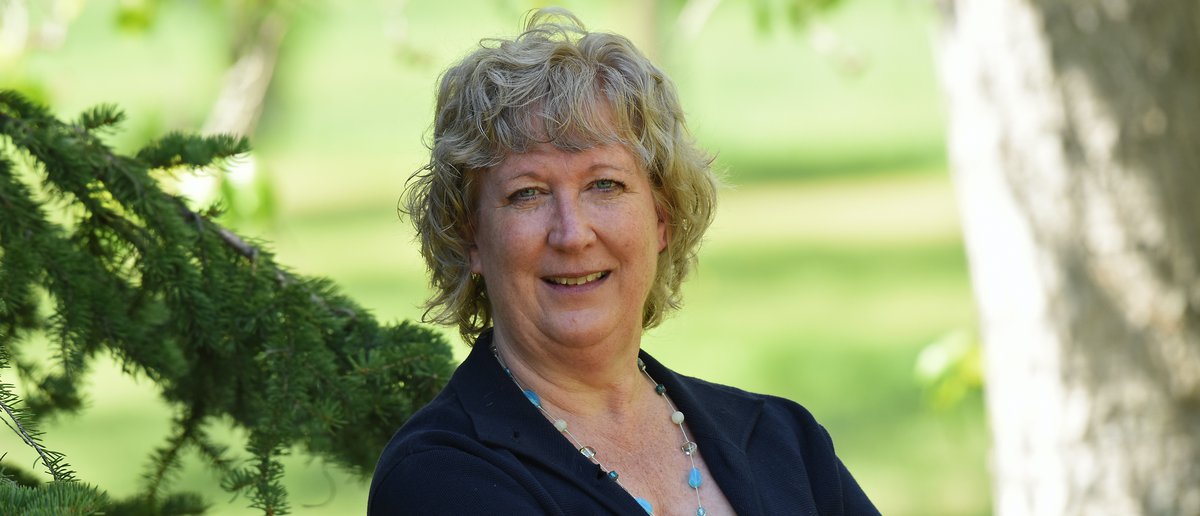Beyond the walls of the office
When a patient comes to Gleichen, Alberta family physician Dr. Joni McNeely with a health concern, she knows that there’s a backstory to most, if not all, matters of physical and mental health. As much as possible, Dr. McNeely strives to “make that connection between a person’s health, their circumstances and their community.”
“Often, doctors try to support patients to build capacity on a personal health level,” says Dr. McNeely. “I think it’s important to go beyond the walls of the office, to the community and other systems that affect people’s health. Healthy communities create healthy people.”
Judging by her nomination by a patient for recognition by the AMA’s Shine A Light program, it’s evident that the people of Gleichen and the surrounding southeastern Alberta communities feel justifiably grateful to have a physician like Dr. McNeely. In the nomination, one of her long-time patients says, “She has been a jewel in this locality as a solitary practitioner, serving both the surrounding rural farming communities and the Siksika Indigenous nation in a very caring, competent and capable manner.”
Describing how Dr. McNeely “acted quickly and decisively” to oversee diagnosis and treatment of “an aggressive and rare form of cancer 20 years ago,” the patient adds,” My family and I have always been grateful for Dr. McNeely’s exceptional care, which she has provided to us with love and attention. She is a remarkable woman!”

The long way to medicine
Born and raised in Calgary, Dr. McNeely began her studies at St. Francis Xavier University in Nova Scotia, where she attended the Coady International Institute. It was here, through relationships formed with her fellow students, that Dr. McNeely developed her passion for social justice.
Next, Dr. McNeely was off-continent to Africa for a year as a volunteer at a mental hospital in Zambia, with Crossroads International. After returning from Africa, Dr. McNeely resumed her studies in anthropology and social work at McGill University, following that with a move to Calgary to study medicine. In 1992, Dr. McNeely finished her residency in rural family medicine and settled happily into her practice and life in Gleichen.
“I’m confident it was a culmination of all those experiences that makes me see patients in the context of their whole existence,” says Dr. McNeely, as she reflects on her path to medicine. “I think of the patient in terms of three things: how they live (their housing, access to food, etc.); how they love (their relationships and safety); and how they do (employment, education, access to recreation).”
Palliative care: bringing quality to life
As president of the Wheatland and Area Hospice Society, Dr. McNeely says, “I saw a need for improved palliative care in our community. It’s some distance to Calgary and people want to stay home as long as possible.”
Dr. McNeely values the new emphasis she’s seeing on an increased trajectory of palliative care. “Often, a palliative diagnosis soon followed a life-limiting diagnosis.”
“It’s a privilege to work with health care volunteers, municipal government, and community in general to create a palliative program that is citizen-led and broad-based, rather than wholly viewed as the health care system’s responsibility.”
“It’s good to see the focus now not so much necessarily on extending the life, but on making the best of a bad situation,” she explains. “Family, friends and the community can play a significant role during this period, giving support physically, emotionally and spiritually.”
“Our hospice societies support these efforts within our communities, outside of the health care system, to provide palliative care,” Dr. McNeely adds. “Just as it takes a village to raise a child, it takes a village to have a good death.”
In addition to the community outreach program, they’ve also developed a bedside respite program and “Dying2Learn,” a community-focused lecture series to increase knowledge and awareness of palliative care.
“It’s immensely satisfying to tackle a problem like community-based palliative care and ask some big questions,” says Dr. McNeely. “Like, ‘What issues are within a community and how do you work to solve them? What does the research tell us? How do we manage the future?’”
See one. Do one. Teach one.
It’s been a satisfying, exciting career, and Dr. McNeely cannot imagine having practiced medicine in any other place or way. As she reflects on her career, many teaching opportunities and moments stand out.
“In medical school, we’re taught ‘See one. Do one. Teach one,’” she says. “This emphasizes that doctors should always be teachers.” A Strathmore High School mentoring program facilitated by her clinic is a personal favorite, because the students job-shadow; Dr. McNeely also teaches a health care studies class at the school.
Another highlight mentoring experience for Dr. McNeely was her role as director of medical services at the Alberta Senior Games in 2015. Whereas the event usually hires St. John Ambulance personnel, Dr. McNeely coordinated the training of “a full team [15] of current and former Strathmore High School students” to be the first aid responders at all the venues.
“That was the first time it had ever been done that way,” she explains. And the payoff moment for Dr. McNeely: of the trained crew, one went on to study medicine and one went into nursing.
“I really enjoy increasing the medical knowledge of our community, whether about palliative care, first aid, or in the high school teaching about the opportunities in medicine and hospital-based care.”
What lies ahead
With retirement on the horizon, Dr. McNeely prepares to close her clinic in Gleichen and “look for a new challenge of some sort,” such as returning to her original passion of supporting social change. “It’s exciting to think about the possibilities of what my fate will be,” contemplates Dr. McNeely.
“One thing is for sure: This is my home. I raised two sons here (Christopher studies science and business at the University of Victoria and Michael studies agriculture at the University of Saskatchewan).” The other “for sure” about her rural community home: it’s nice to be where you are loved, and Gleichen (and area) loves Dr. McNeely.
Introducing … Dr. Joni McNeely
Years in practice
28Why medicine?
Not many young people are aware of this, but in the early 1960s, the City of Calgary had a policy to terminate women employees once they married. My mom was one of these. As a social worker, she nurtured my awareness of others, and encouraged me to enter a profession where I could determine my own career path.
Mantra/philosophy of life
- Family first.
- Make a difference.
- Bring about change.
About Shine A Light
Initiated by Dr. Alison Clarke during her 2018-19 term as president, AMA’s Shine A Light program recognizes and celebrates the special physicians of Alberta who, in their “everyday” practices, demonstrate an unwavering commitment to caring for their patients; to ensuring that their patients receive top quality, coordinated care; to seeking patient-centered ways to improve the delivery of health care in Alberta; and to always seeing the people in their patients.
Nominate a colleague
Do you know a physician who the AMA should ‘Shine A Light’ on? If so, please submit a nomination form.

